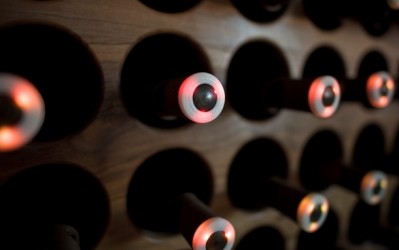New detection technology may yield a TCA-free future for cork suppliers

Initially used for premium wine brands, NDTech is now being applied to cork stoppers found on wines of varying price points.
TCA contamination
TCA is a naturally occurring chemical compound that alters the smell and taste of many packaged food and beverage products, but particularly those with cork, Amorim’s Head of Marketing Carlos de Jesus told BeverageDaily.
“The lowdown on TCA is that it’s a molecule you find it in all sorts of situations from coffee to tap water, it’s omnipresent,” he said.
“Even at very low concentrations, we’re talking about nanograms, it may cause some sensory deviations. Cork is a material that has great affinity with TCA.”
Although harmless to consume, corked wines containing TCA can have a characteristic musty or corky odor, according to the The Wine Institute.
The development of the NDtech follows a five-year $11.1bn research and development investment by Amorim and a partnership with a British company specializing in gas chromatography. Two wine industry research facilities — Hochschule Geisenheim University and The Australian Wine Research Institute (AWRI) — have independently validated the performance of NDtech.
Individual screening process
Using gas chromatography, NDTech can detect a cork contaminated with more than 0.5 nanograms of TCA per liter (parts per trillion) - the equivalent of one drop of water in 800 Olympic size swimming pools - in a matter of seconds. Prior to NDTech, the TCA detection process used to take up to 15 minutes.
Corks contaminated with detectable amounts of TCA are removed from the production line automatically.
The automated system provides winemakers with a non-detectable TCA guarantee to winemakers, a first for the cork industry, the company said.
Creating a TCA-free corked wine culture
A consumer is unable to detect TCA which is only present in roughly 0.8% of cork-topped bottles, de Jesus said. Despite the relatively low occurrence of TCA in cork stoppers, the need for technology like NDTech is crucial to assure a high-quality product, and sets a new standard for corked wine bottles.
The technology also give natural cork stoppers an edge over the synthetic cork market, which used to capitalize on some cork containing trace amounts of TCA. With NDTech, however, cork producers now have a way to guarantee stoppers free of detectable TCA.
The use of guaranteed TCA-free corks is already becoming the norm among winemakers producing wine at varying levels of price and quality, de Jesus said.
“The response from winemakers has been as positive as we had anticipated, especially given the important role that premium packaging has for wine exports to crucial markets such as the US and China,” de Jesus said.
“Wineries in France, US, Italy, Spain, Germany and Portugal have already taken delivery of our NDtech checked corks.”











